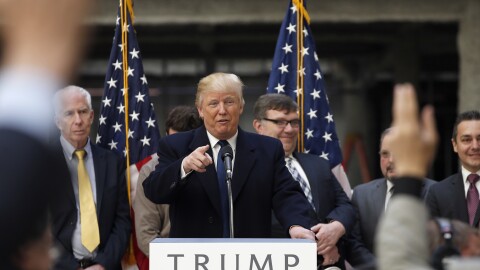President-elect Donald Trump won a convincing electoral vote victory on Nov. 8, but he is claiming falsely that widespread voter fraud cost him the popular vote.
The latest totals show Hillary Clinton leading Trump in the popular vote by more than 2 million. Trump tweeted on Sunday afternoon, "I won the popular vote if you deduct the millions of people who voted illegally." He did not provide evidence to back up that claim, and Trump's representatives did not immediately respond to a request for more information.
Trump's unfounded claim appears to have originated with the website Infowars and radio host Alex Jones, who reported that 3 million people voted illegally, citing flawed evidence. Jones frequently promotes conspiracy theories, including a false story in 2015 that President Obama was planning to use special forces to impose martial law in Texas that got traction with the state's governor for a time. Jones has also said the 2012 massacre at Sandy Hook Elementary School in Newtown, Conn., was "fake."
Trump has appeared on Jones' radio show and praised him. "Your reputation is amazing. I will not let you down," Trump told him during the campaign.
PolitiFact tracked down the claim of millions of illegal votes from people who are not citizens and rated it "false." It found that the Infowars story cited a report that did not exist and tweets from an individual who claims to have such information about illegal voting but would not provide it.
The fact-checking group also cites multiple reports that show just a handful of anomalous votes in recent years. One investigation "found just 56 cases of noncitizens voting between 2000 and 2011."
Trump's claims about the popular vote would have no weight, anyway, on whether he won the election since it is decided by the Electoral College.
Trump currently has 290 Electoral College votes, according to The Associated Press — well more than the 270 he needs to win the presidency.
That total is expected to grow when Michigan certifies its vote on Monday. Trump leads in that state by more than 10,000 votes, and the state's 16 Electoral College votes would push Trump's total over 300.
Trump started tweeting on Sunday amid a push for recounts in Michigan, Pennsylvania and Wisconsin by Green Party candidate Jill Stein.
Those states essentially delivered Trump victory in the presidential election, as they had made up the Democrats' so-called "blue wall" — industrial states that secured victories for Barack Obama in 2008 and 2012.
Trump's tweets over the weekend have both criticized the calls for recounts in the three key industrial states he won, while simultaneously raising questions about the integrity of the vote nationwide. Trump tweeted another claim without evidence on Sunday evening, regarding voter fraud in Virginia, New Hampshire and California — all states Clinton won.
California Secretary of State Alex Padilla responded with a statement: "It appears that Mr. Trump is troubled by the fact that a growing majority of Americans did not vote for him. His unsubstantiated allegations of voter fraud in California and elsewhere are absurd. His reckless tweets are inappropriate and unbecoming of a President-elect."
As the recount proceeds in Wisconsin, Hillary Clinton's legal team will participate, citing concerns from supporters over the integrity of the vote, though the campaign says it has not seen any evidence to support those concerns. Jill Stein told NPR that she does not expect the outcome to change. Trump's margins in the states in question measure in the tens of thousands. Recounts generally have had an impact on the result of an election only when the margins are in the range of several hundred.
Stein's and Clinton's teams cited concerns over the integrity of voting systems, which Trump himself discussed during the campaign. He would often say that the only way he could lose would be if the election was "stolen," and Clinton called Trump's remark in a debate that he might not accept the results if he lost "horrifying."
Clinton conceded the race to Trump in the early morning hours of Nov. 9 and gave a speech later that day declaring "Donald Trump is going to be our president. We owe him an open mind and the chance to lead."
The former Democratic nominee is not pulling back from that position, and her campaign is trying to distinguish between its decision to have legal representatives participate in the Wisconsin recount and actually promoting it, which the campaign says it has not done.
"Because we had not uncovered any actionable evidence of hacking or outside attempts to alter the voting technology, we had not planned to exercise this option ourselves, but now that a recount has been initiated in Wisconsin, we intend to participate in order to ensure the process proceeds in a manner that is fair to all sides," Marc Elias, the general counsel for Clinton's campaign, wrote Saturday.
But Elias also said the campaign had received "hundreds of messages, emails, and calls urging us to do something, anything, to investigate claims that the election results were hacked and altered in a way to disadvantage Secretary Clinton." No evidence has emerged to support those claims.
Wisconsin granted the request for a recount on Friday. It's expected to start at some point this week. It will have to be completed by Dec. 13, in compliance with federal law that requires any recounts to be finished 35 days after the election. In Wisconsin, the requests came from Stein and independent candidate Roque "Rocky" De La Fuente, and they will have to cover the costs of the recount.
Stein has raised more than $6 million in support of these efforts.
The deadline to formally request a recount in Pennsylvania, where Trump had his biggest margin of victory of the three states in question, is Monday.
Michigan appears to be Trump's closest margin of victory, and the state is set to certify its results at 2 p.m. ET on Monday; then, a request for a recount must be submitted by Wednesday.
Copyright 2021 NPR. To see more, visit https://www.npr.org. 9(MDA5NTM4MTIyMDE0MTg3NDc2MTVlZjdmNQ001))







